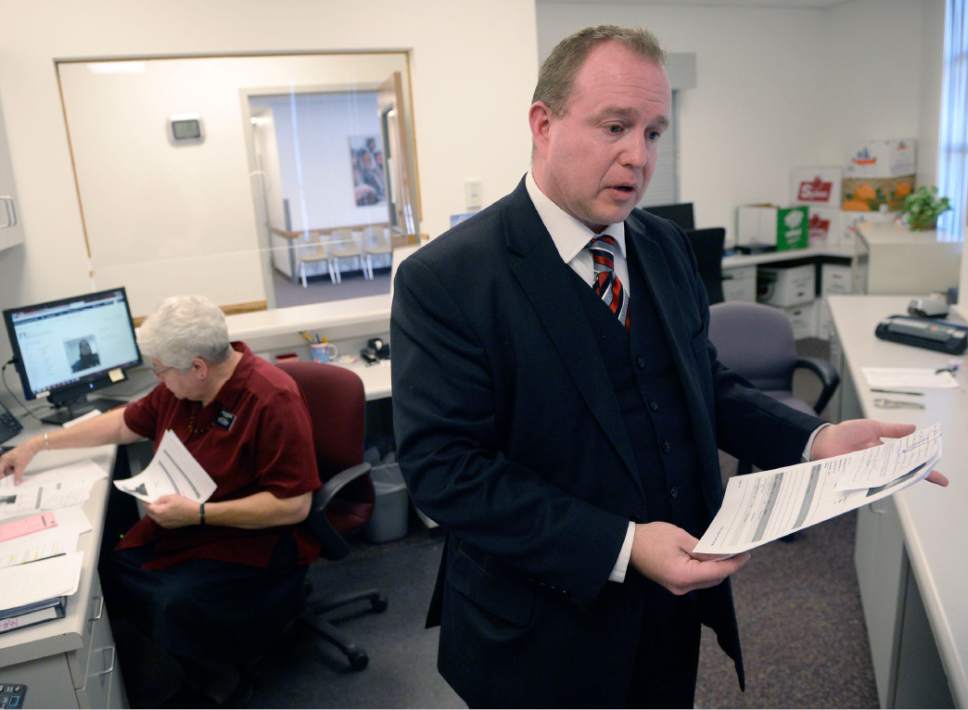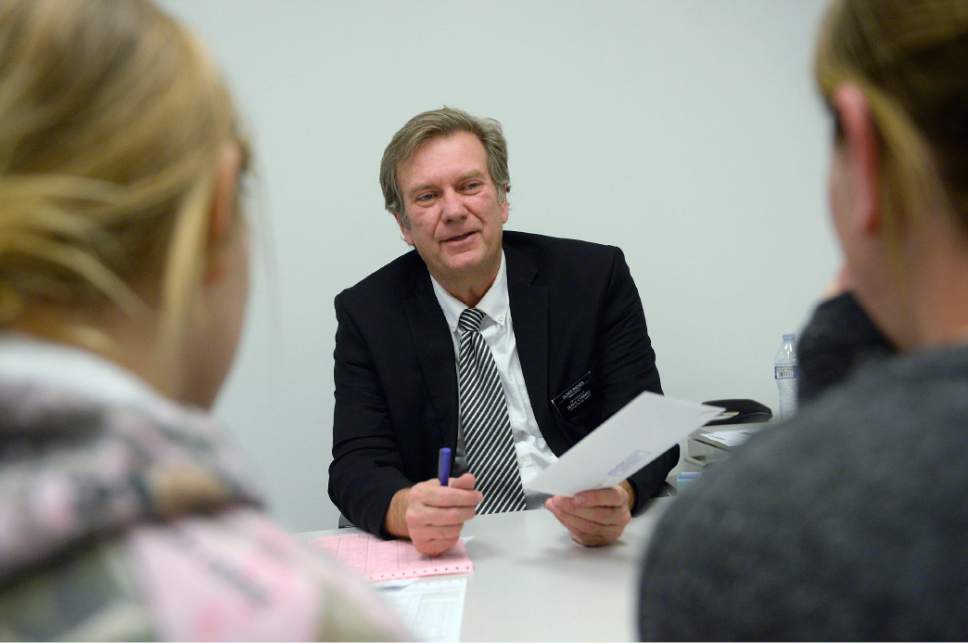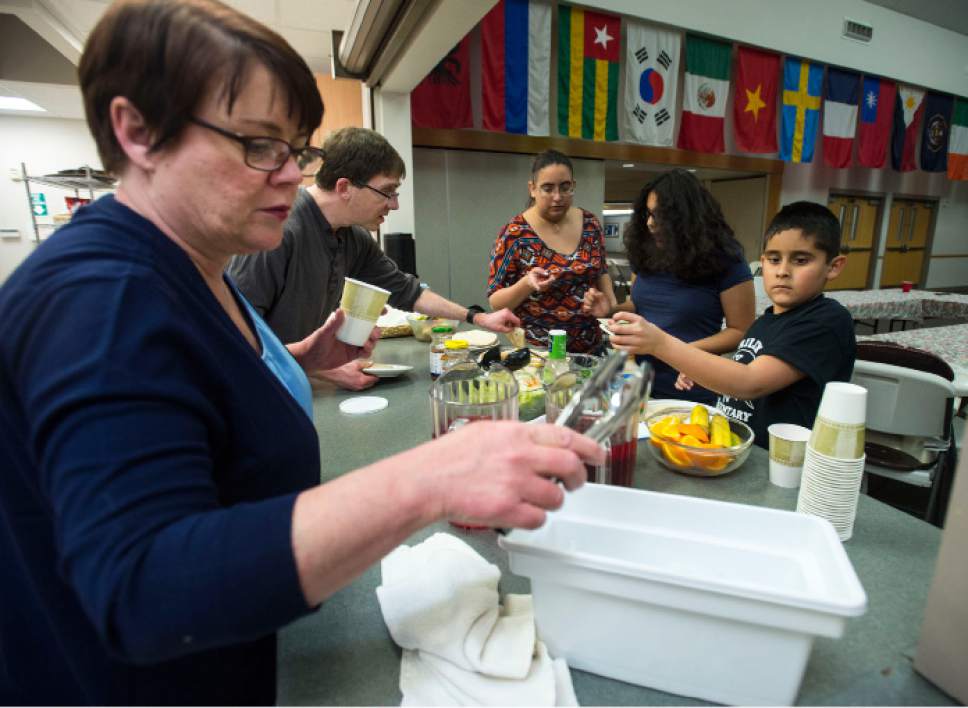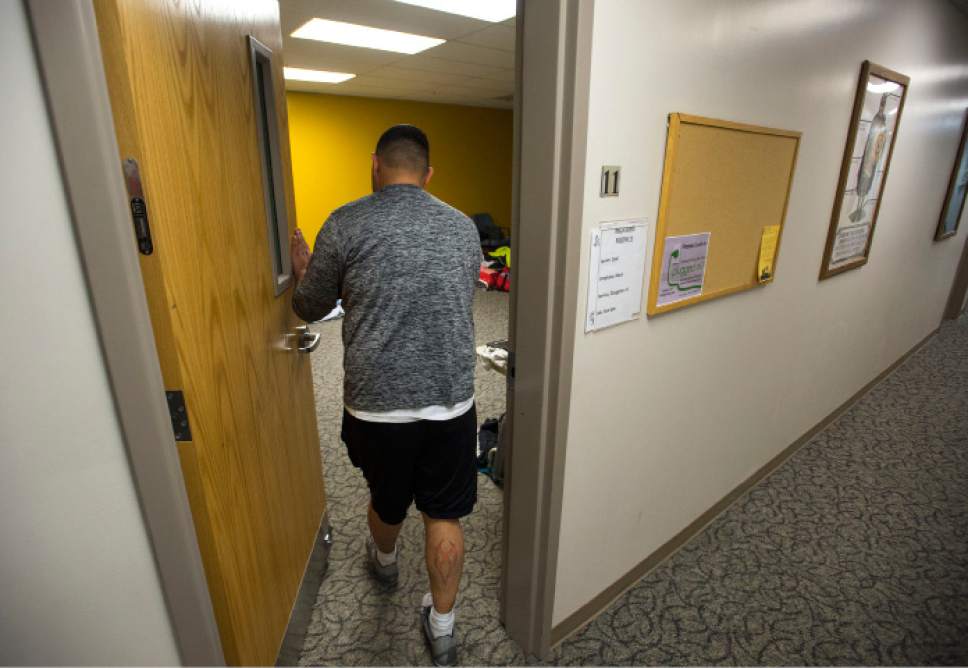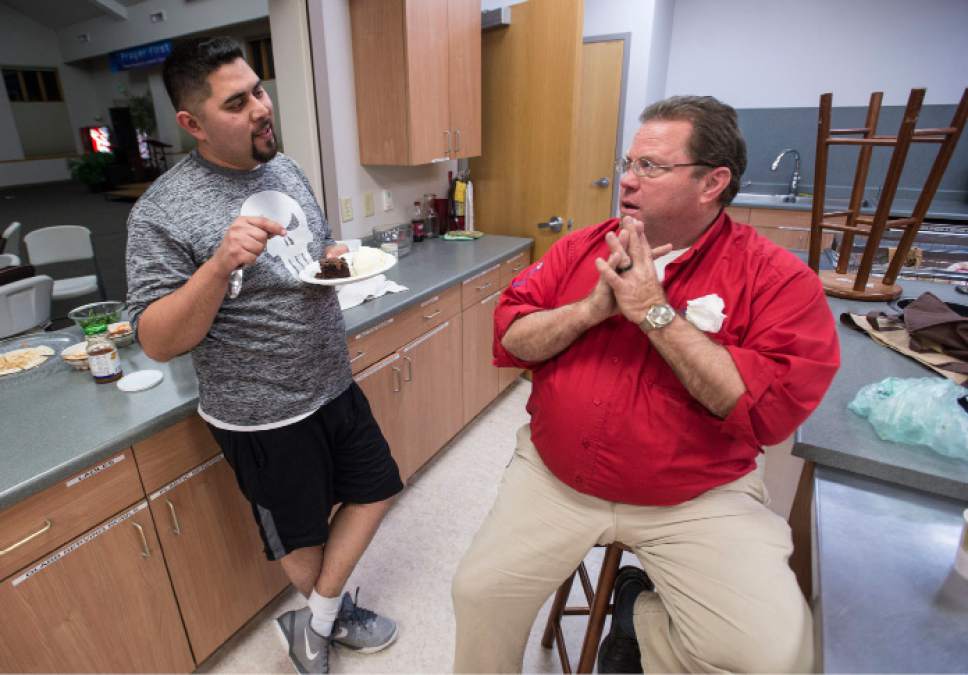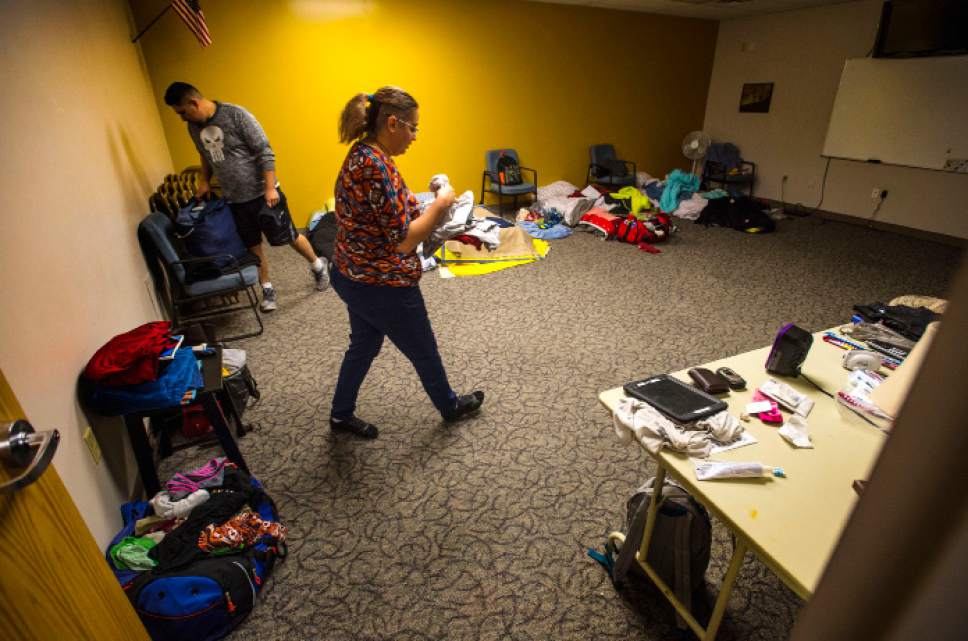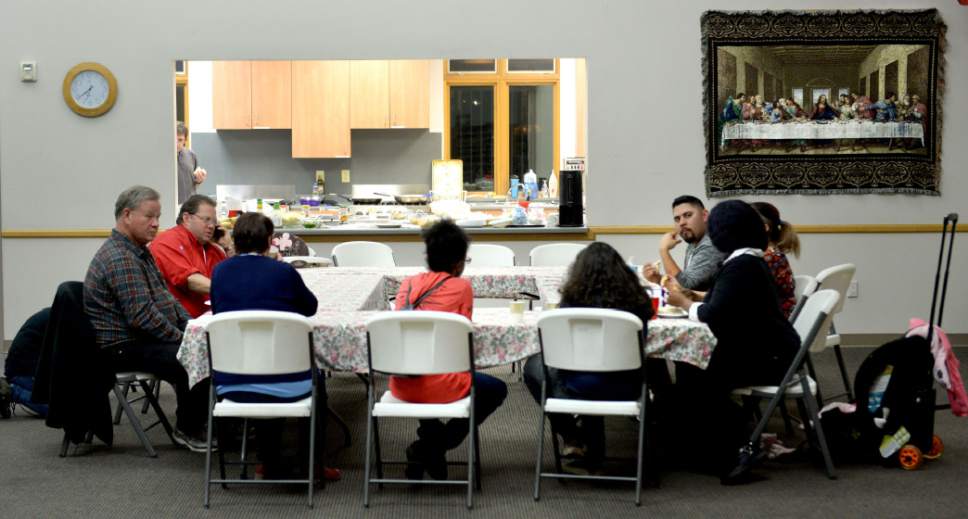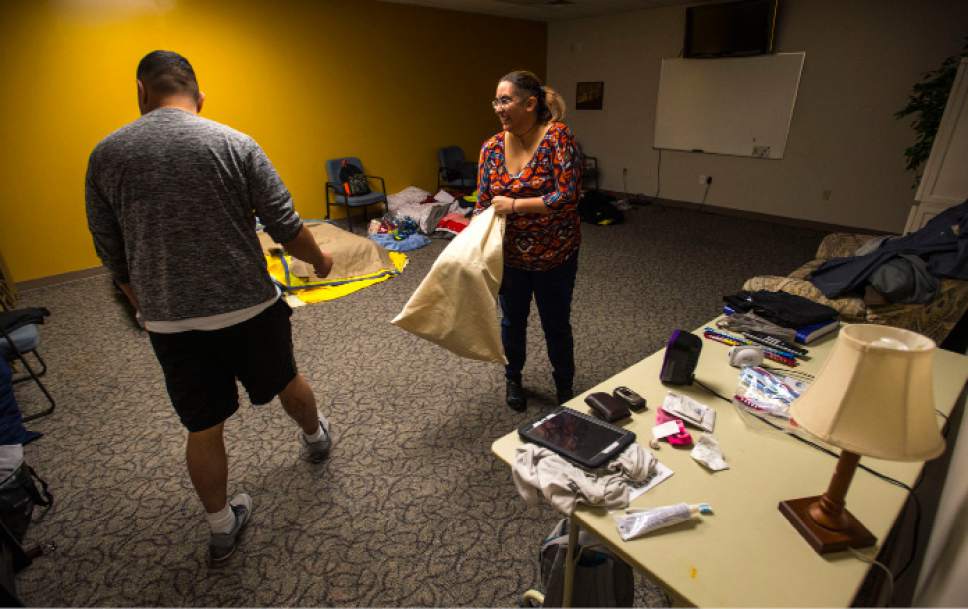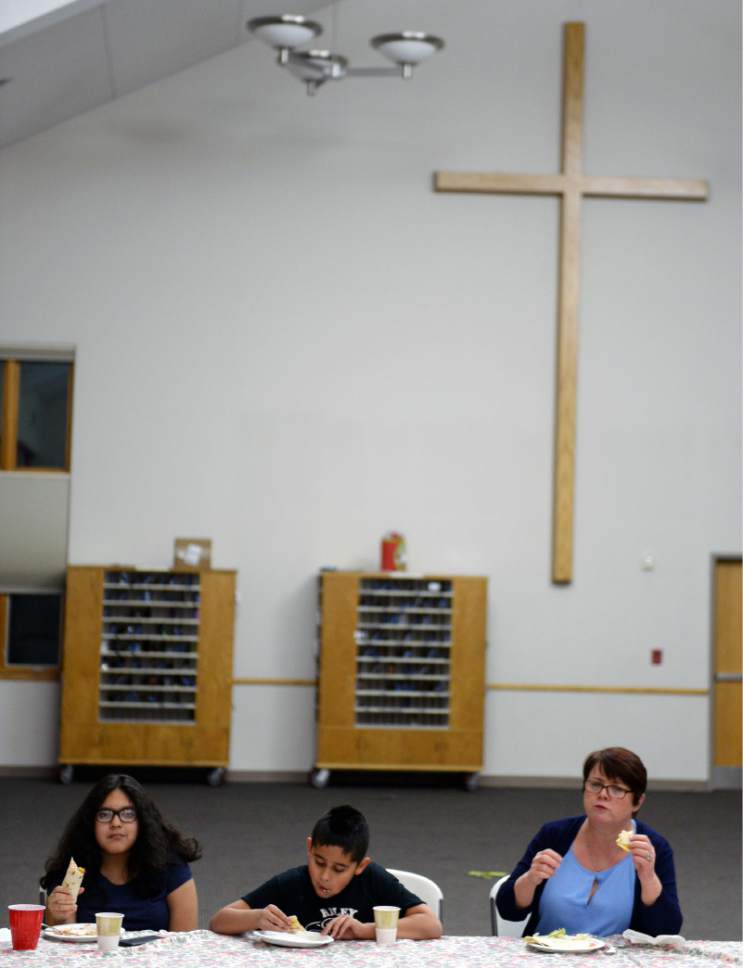This is an archived article that was published on sltrib.com in 2017, and information in the article may be outdated. It is provided only for personal research purposes and may not be reprinted.
Sandy • As Javier Tinajero was strolling up the sidewalk to check out a downtown Salt Lake City shelter, three separate shaggy-haired pushers offered him illicit drugs.
The recently homeless father, who had just arrived from Wyoming, was appalled but found the building's interior — teeming with unkempt, unruly residents — even more sketchy.
No way, Tinajero thought, could he subject his wife, Stephanie, and their two preteen children, Jessica and Jak, to that environment. Still, the U.S. veteran, who had fought in Afghanistan, was caught between two cruel economic realities — his job paid just enough to make him ineligible for grants or other services, but not enough to get the family into low-income housing (or to pay for his post-traumatic stress disorder medications).
That's when heavenly favor, or sheer luck, smiled on the Bible-believing clan as a faith-based group called Family Promise reached out and took the family in — literally — allowing the Tinajeros to dine and bunk at an area church.
After all, that's what religions should do, right? Especially as the Salt Lake Valley grapples with a "crisis" of homelessness, and congregants weigh whether to embrace or oppose plans for resource centers in their neighborhoods.
Churches provide not only a moral compass to communities through words, but also preach meaningful sermons through their actions. As the Good Book says, "For I was an hungred, and ye gave me meat: I was thirsty, and ye gave me drink: I was a stranger, and ye took me in."
Taking in the stranger — that's the promise of Family Promise. Formerly known as the Interfaith Hospitality Network, the nondenominational nonprofit organization enlists churches to take weekly turns housing four to six homeless families in their Sunday school classrooms-turned-bedrooms. Applicants undergo strenuous vetting (screenings for criminal backgrounds, substance abuse and mental health issues) and then wait, sometimes for five to six weeks, to get a place.
The Tinajeros became "guests" — as they are called — for the week at Sandy's Good Shepherd Lutheran Church. Tucked amid biblical posters and a sign with "God" spelled out in giant letters, they bed down on donated mattresses and scrupulously laundered linens. Guests without their own sleeping bags are provided blankets and comforters.
They shower down the hall, use donated shampoo, soap and toothpaste, wash and dry their clothes in available machines, fiddle with toys in the playroom, and chow down for dinner and breakfast in the large recreation hall. They can talk with a mentor, brainstorm with a job specialist, pick out clothes to wear to interviews or get relationship advice from coordinators.
"We are not social workers or case managers — we are 'super volunteers,' " notes Steve Fredine, who oversees the program at Good Shepherd Lutheran. "But we can listen."
Here's what Family Promise says you can't do: drink, shoot up, steal, destroy furniture or have a pet — not even the Tinajeros' pit bull ("Asking me to give up my dog," Javier says, "was like asking me to give up one of my kids").
You also can't stay in the system forever.
"This is not a handout," Fredine explains. "We want people to get their act together and 'graduate.' "
In the past few decades, Family Promise has grown into a massive effort, engaging more than a dozen Salt Lake Valley religious communities and hundreds of participants.
This is more than just being nice, many religious folks believe. It's a divine mandate.
Common goal • More than 30 Utah Christian and Jewish congregations will participate this weekend in what they have dubbed the "Ending Child Homelessness Sabbath."
They will be imploring deity to inspire local and state governments to help kids on the streets right now, according to the Crossroads Urban Center, and to prevent future youngsters from winding up there.
God requires Christians to offer hospitality to anyone in need, especially those without support, says the Rev. Steve Klemz, pastor at Salt Lake City's Zion Evangelical Lutheran Church, one of the participating congregations.
"It's within my call as a pastor to publicly stand for the poor," Klemz says. "They are not just homeless — it's Barb, Becky and Sam. Real people."
Caring for the homeless, says the Rev. Marijke Rossi, pastor at Salt Lake City's First Congregational Church, is a moral issue.
"It's pretty constantly on our minds and in our prayer life," Rossi says. "We pray about it every Sunday."
Though Hinduism is not monotheistic, its followers also feel a transcendent push to assist the downtrodden.
"Traditionally, those who have no place to stay will come and stay at the temple," says Utah Hindu Indra Neelameggham. "That does not work in this country."
Instead, Hindus, at least in the Beehive State, gather in small groups to cook for the homeless, she says, and South Jordan's Sri Ganesha Temple, as part of its prayer service, provides food "for those who go hungry."
The Gurdwara Sahib Sikh Temple in Taylorsville routinely offers a free meal to any who show up on Sunday.
Many faith groups that do not house the homeless kick in money, blankets, hygiene kits and volunteers to churches that do. They may also donate directly to the shelters.
Such religious collaboration makes a difference. A recent study by Baylor University found that "cities with higher participation by religious groups had lower percentages of unsheltered homeless people," Religion News Service reports.
With or without such research, many Salt Lake City churches view their role as key.
Food to fellowship • Family Promise was born in 1981. New Jersey marketing executive Karen Olson was on her way to work when she spied the familiar face of a homeless woman she had silently passed time after time.
That day, Olson bought the stranger a sandwich, she writes on the national Family Promise website, "but [the homeless woman] asked for something else — a moment to be heard, to be comforted, and to be considered as more than a mere statistic on a cold street corner."
Before long, the businesswoman thought to engage area congregations to provide overnight housing space and warm meals within their buildings. By Oct. 27, 1986, the first Interfaith Hospitality Network opened its doors.
The nationwide program (which changed its name to Family Promise in 2003) now supports more than 53,000 homeless family members annually, the site says, and 60 percent of them are children.
Utah's chapter, which requires elaborate scheduling and coordinating, launched two decades ago — and has continued to grow.
For years, St. Stephen's Episcopal Church in West Valley City has partnered with other congregations and schools to support food banks to help the hungry, especially students who have nothing to eat on the weekends.
This past year, the church became a Family Promise site.
"For one week, the guests have safety and shelter and a place to store their things while they go off for the day," says the Rev. Mary Janda, vicar at St. Stephen's. "It allows us to do what we should be doing — we are called to take care of them, and this is the time."
A different approach • Though Mormon chapels dot the Salt Lake Valley, none of them houses the homeless. The Church of Jesus Christ of Latter-day Saints instead takes a programmatic approach toward helping the hungry and homeless.
Greg Young, working out of the church's giant Welfare Square in west Salt Lake City, manages "transitional services," assessing the needs of stranded travelers, former inmates, transients and the mentally ill.
If the person is or was Mormon, Young might reach out to his or her bishop — a lay minister — for suggestions on how best to meet any immediate needs. Other men have been tapped as "transient bishops," with responsibilities to jump into any emergency. Scores of retired couples, doing humanitarian work, help to coordinate these and many other services — mentoring, preparing for job interviews, language training and legal assistance.
The program is not just for Mormons. Young can authorize vouchers for food, bus passes, clothing at Deseret Industries, even short-term stays at a motel — in exchange for a few hours labor at church facilities (for those who are able) — as can managers at one of the faith's seven "transition sites" across the western United States. The LDS Church also works with various social service agencies and donates millions of dollars to providers.
The goal is to break "the poverty mindset," Young says. "We believe in hope for everyone."
Dual purpose • When Utah Muslim Wagma Mohmand and an Islamic friend graduated from the University of Utah in 2009, they created an organization, United in Service for Humanity, to continue the community service and social work they had done in college.
They also planned to burst some stereotypes about Islam, to show that Muslims are "normal people," dedicated to service like so many others.
"Prophet Muhammad was a humanitarian, who said to treat our neighbors how we want to be treated," explains Mohmand, who works as a physician assistant on Salt Lake City's west side. "He had a lot of power and could have all the riches he wanted. Instead, he lived a poor, modest life. If he had only dates and water to eat, when a guest came, he would give them both."
The United in Service group, organizers believed, would bring together volunteers from diverse backgrounds in collective action to aid refugees and the homeless.
At first, the two friends simply spent their time serving dinners at shelters, but slowly they moved toward more medical assistance.
In October, they sponsored a Day of Unity event at St. Vincent de Paul in Salt Lake City's Rio Grande neighborhood and enlisted scores of health care professionals and others to provide fluoride application, diabetes and hypertension education, smoking-cessation information, flu shots, hygiene kits, winter clothing and food kits.
About half the volunteers are Muslims, Mohmand says, while the rest come from varying backgrounds, including those with no religious links. The group's governing board, for instance, now includes a Mormon.
"We wanted to send a message of commonality in community," she says. "We are your neighbors."
The same goes for the homeless, religious believers attest. They are our neighbors.
Twitter: @religiongal —
A divine duty
Behold, this was the iniquity of thy sister Sodom, pride, fulness of bread, and abundance of idleness was in her and in her daughters, neither did she strengthen the hand of the poor and needy.
Ezekiel 16:49
For I was an hungred, and ye gave me meat: I was thirsty, and ye gave me drink: I was a stranger, and ye took me in:
Naked, and ye clothed me: I was sick, and ye visited me: I was in prison, and ye came unto me.
Matthew 25:35-36
"They will ask you [Muhammad] about almsgiving. Say, 'Whatever you give in charity shall go to parents and to kin, to the orphans and to the destitute, and to the traveler in need. God is fully aware of whatever good you do.' "
Quran, 2:215
"Ye will not suffer that the beggar putteth up his petition to you in vain, and turn him out to perish. Perhaps thou shalt say: The man has brought upon himself his misery; therefore I will stay my hand, and will not give unto him of my food, nor impart unto him of my substance that he may not suffer, for his punishments are just — but I say unto you, O man, whosoever doeth this the same hath great cause to repent. ... For behold, are we not all beggars? Do we not all depend upon the same Being, even God, for all the substance which we have?"
Mosiah 4:16-19 (The Book of Mormon)


